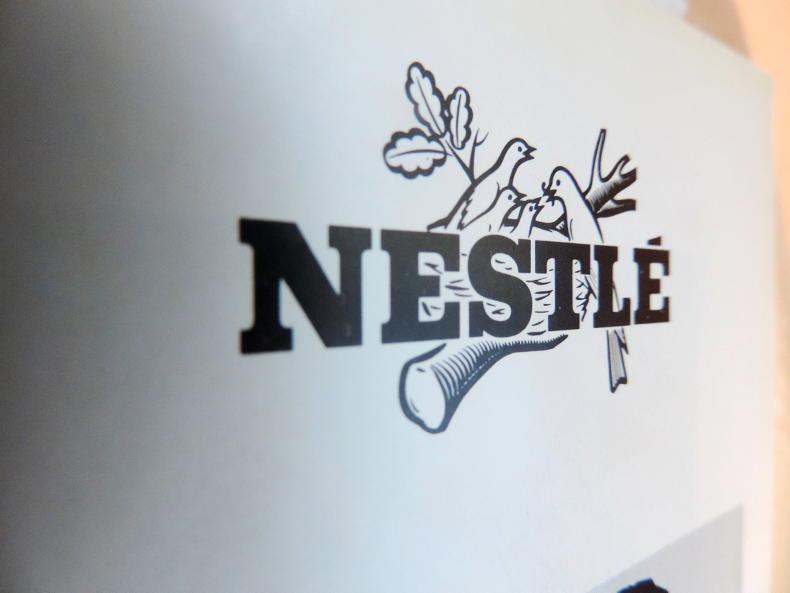Global food giant Nestlé, the world’s largest food company, says it will pay farmers a ‘premium’ price for food produced from regenerative agricultural practices. Unveiling its 2050 carbon neutral strategy last week, the Swiss food giant said it expects to source 14m tonnes of food ingredients from regenerative agriculture systems by 2030.
Nestlé operates a major infant formula business here in Ireland, known as Wyeth Nutritionals Ireland. This business produces up to 40,000t of infant formula every year from its plant in Askeaton, Co Limerick, and is a significant customer for Irish dairy ingredients.
Of this €3bn investment, Nestlé said over €1.1bn would be dedicated to encouraging regenerative agricultural practices
As part of its strategy to become carbon neutral within its full supply chain by 2050, Nestlé said it would invest €3bn over the next five years to accelerate emissions reductions across its business. Of this €3bn investment, Nestlé said over €1.1bn would be dedicated to encouraging regenerative agricultural practices within its supply chain.
Reforestation
On top of the investment in regenerative agriculture, Nestlé said it will be scaling up its reforestation programme, with the goal of planting 20m trees every year for the next decade. The company said its primary supply chains of key commodities, such as palm oil and soya, will be deforestation-free by 2022.
Nestlé said it also expects to transition its 800 food manufacturing and packing sites across the globe to 100% renewable electricity by 2025. However, the biggest challenge for many food processors is finding a renewable alternative to natural gas, which is a key energy input for the global food industry.
These efforts will reduce emissions and improve biodiversity at scale
Nestlé said it would be using its carbon emissions from 2018 as its baseline year for measuring reductions. In total, the company said its greenhouse gas emissions for 2018 stood at 92m tonnes, which is 30m tonnes more than the total emissions produced by the entire Irish economy last year.
“With nearly two-thirds of our emissions coming from agriculture, it is clear that regenerative agriculture and reforestation are the focal points of our path to net zero. These efforts will reduce emissions and improve biodiversity at scale.
“We will also continue to eliminate emissions from our operations and make improvements in our product portfolio. We have our work cut out for us and we are committed to delivering,” said Magdi Batato, executive vice-president and head of operations at Nestlé.
Last week’s announcement that Nestlé aims to be carbon neutral by 2050 follows a similar target set earlier this year by its rival Danone, the French dairy and bottled water giant, and drinks company Diageo. Each of these global multinationals have huge and complex supply chains, sourcing ingredients from all over the world. All three companies also have significant operations in Ireland.
Like most food and drink multinationals, the bulk of emissions attributed to Nestlé, Danone and Diageo come from the primary agriculture sector within their supply chains. For example, the emissions from Irish dairy farms that supply the milk used as raw material for the dairy ingredients purchased by Danone and Nestlé from Irish co-ops are included in their total carbon footprint.
Nestlé has stated it will pay a premium price for ingredients produced via regenerative agriculture
And so, when companies like Danone, Nestlé and Diageo set ambitious targets like these, you can be sure it will have a profound knock-on impact for farmers within their supply chain.
Whether it’s coffee from Brazil, cocoa from west Africa or dairy from Ireland, farmers all over the world that feed into the Nestlé supply chain are going to be asked to adapt their production systems to help global food brands meet their sustainability targets. In order to encourage this adaption, Nestlé has stated it will pay a premium price for ingredients produced via regenerative agriculture. However, the company hasn’t yet set out in detail what constitutes regenerative agriculture or what level of a premium this will attract.
The big question farmers will rightly ask is how genuine companies like Nestlé are about paying a premium price to farmers for sustainable produce. Irish farmers can attest better than anyone how highly safe and traceable grass-fed dairy ingredients used in infant formula have been commoditised to the point where they are valued at little more than world market prices.
Will the changes in production systems demanded by Danone, Nestlé and Diageo lead to a future of higher, more sustainable farmgate prices? Or will this push for regenerative agriculture practices eventually lead to another race to the bottom with commodity pricing?
With most global food brands listed on stock markets and under pressure to maintain high profit margins for their shareholders, farmers could be forgiven for being cynical when they hear these announcements.






 This is a subscriber-only article
This is a subscriber-only article











SHARING OPTIONS: